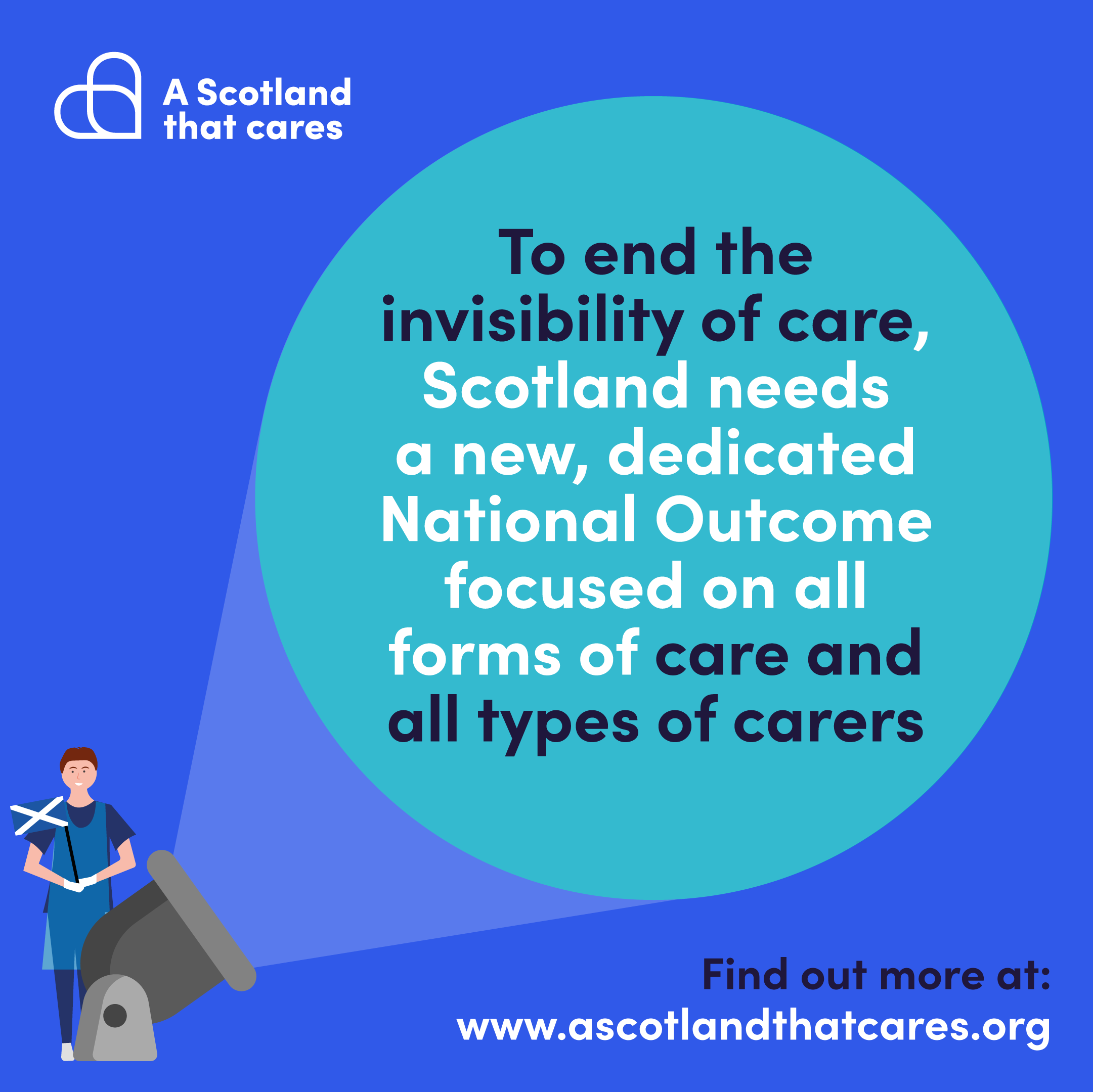New data also suggests 1 in 3 Scots have caring responsibilities
The Scottish Government is being challenged to make a ‘transformative and world leading commitment to all carers’, as new polling reveals the overwhelming belief of people across Scotland that carers of all kinds are undervalued.
The poll, carried out by YouGov on behalf of the A Scotland That Cares campaign, shows that a staggering one in three adults (30%) in Scotland have caring responsibilities*; with respondents saying they are a parent (15%) or look after a child informally (7%), are an unpaid carer for someone who is ill, disabled or elderly (7%), or are employed in a paid caring role (2%).
While caring is widespread, the data exposes that nearly three quarters (74%) of adults in Scotland believe that care work is not valued highly enough by the Scottish Government.
This figure represents a significant jump since the peak of the pandemic in 2020, when 62% of Scottish adults said they didn’t think care work was valued highly enough by the Scottish Government.
The polling also reveals the majority of people don’t think that the increased attention on the role of carers during the pandemic resulted in any additional practical support for paid carers (57%), unpaid carers (61%) or parents (55%).
The A Scotland That Cares campaign, which is backed by over 60 organisations including frontline organisations representing unpaid carers, parents and paid care workers as well as prominent anti-poverty charities and think tanks, is calling on the Scottish Government to urgently address the public’s concerns and the deep undervaluation of the nation’s carers.
Becky Duff, Director of Carers Trust Scotland, said: “The pandemic shone an unblinking spotlight on how essential the roles of unpaid carers and paid care workers are for holding society together. We are incredibly disappointed that despite this increased attention, most people believe that nothing has really changed for carers. People across Scotland are even more concerned now than they were during the pandemic about how valued carers are, including by Scottish Government. These findings send a clear message: the scale of action needs to go further, faster by putting carers at the heart of Scottish Government’s plans for Scotland’s future.”
Alongside immediately accelerating and deepening action to boost support for all those with caring responsibilities, campaigners say the Scottish Government must lock-in a commitment to transformative change. They say the current review of its ‘National Outcomes’ – the goals which it says describe ‘the kind of Scotland’ it wishes to create – provides Ministers with a golden opportunity to demonstrate its support for carers.
The Scottish Government has 11 existing National Outcomes, including on health, poverty, the environment and education. Progress on each Outcome is measured by a number of indicators, and the Outcomes are intended to drive policy and spending decision-making.
However, there is no dedicated National Outcome on care: a glaring omission which campaigners believe should be addressed when Scottish Ministers lay draft new National Outcomes before Parliament in the coming months.
Carmen Martinez, Coordinator of the Scottish Women’s Budget Group, said: “Most of us will know someone who does care work – whether paid or unpaid – or even be one ourselves, with women being much more likely to be carers than men. But all of us will need to be cared for at some point in our lives. Yet, although caring is crucial to us all, it is chronically undervalued; it’s very telling that carers don’t even feature in the Scottish Government’s existing vision for the country. It’s time for Ministers to right that wrong, by creating a new, robust National Outcome on care to drive the actions needed to fully value and invest in care and all those who provide it.”
The new polling demonstrates strong public support for a new National Outcome on care, with nearly two-thirds (64%) of adults in Scotland saying they back it.
Campaigners say that while creating a National Outcome on care wouldn’t be a silver bullet to address the multiple issues faced by different types of carers, it would provide a strong focus for new, and sustained, policy and spending action at national and local levels.
The A Scotland That Cares campaign says it must be accompanied by robust and cross-cutting National Indicators, to measure progress meaningfully and transparently, including to ensure carers have the practical and financial support they need.
If implemented, Scotland would become one of the first countries in the world to make such an explicit commitment to driving and transparently measuring progress on how care is valued.
Jamie Livingstone, Head of Oxfam Scotland, said: “Care matters deeply to us all. Scotland’s communities and economy is underpinned by the invisible yet invaluable efforts of people who look after others, too many of whom face significant personal impacts, including poverty. Yet politicians’ warm words and pandemic plaudits haven’t been and will never be enough. The Scottish Government has a golden opportunity to make a transformative and world leading commitment to carers by placing them at the heart of its vision for the country through the creation of a new National Outcome on care; it must take it.”
/ENDS
For more information please contact: Rebecca Lozza, Oxfam Media and Communications Adviser, Scotland and Wales: rlozza1@oxfam.org.uk / 07917738450
Notes to Editors
- All figures, unless otherwise stated, are from YouGov Plc. Total sample size was 1,012 adults. Fieldwork was undertaken between 6th – 10th October 2023. The survey was carried out online. The figures have been weighted and are representative of all adults in Scotland (aged 18+).
- *Please note this was a multiple-choice question, so some respondents may have selected more than one answer.
- Find out more about the A Scotland That Cares campaign here: https://ascotlandthatcares.org/
